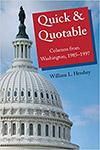Review — QUICK & QUOTABLE by William Hershey (Ethiopia)
 Quick & Quotable: Columns from Washington, 1985–1997 (Bliss Institute series)
Quick & Quotable: Columns from Washington, 1985–1997 (Bliss Institute series)
William L. Hershey (Ethiopia 1968–70)
The University Of Akron Press
March, 2020
246 pages
$24.74 (paperback)
Reviewed by Kathleen Johnson Coskran (Ethiopia 1965-67)
•
Quick and Quotable is just that, and I would add amusing, insightful, and always interesting even if the main “characters” are new to the reader. The temptation for the reviewer is to simply quote Hershey’s best quotable lines, but then the review would be almost as long as the book.
The columns are from Hershey’s 13 years (1987—1997) as the Akron Beacon Journal’s Washington correspondent. He was charged to report news pertinent to Akron readers and wrote weekly columns “to take a look behind the headlines,” to engage and inform as well as entertain, and he thought of them “as sending letters back home from a foreign country.”
For the reader in 2020, at least a reader of a certain age, there is a nostalgia coupled with the shock of a reference to something that seemed so important at the time and is now barely remembered. The June 15, 1987, column opens with “The capital was too preoccupied with Fawn Hall last week to pay much attention to an Akron grandmother whose glasses kept slipping off her nose.” Fawn Hall! I haven’t thought of her in 30 years, which is just as well. The Akron grandmother protesting continued nuclear testing was ultimately more consequential than the “fetching Miss Hall” and her role as Oliver North’s chief document shredder.
The Ohio congressional delegation are the most frequent . . . targets? beneficiaries? subjects? of Hershey’s columns. I was unfamiliar with most of them, with the notable exception of Senator John Glenn, but they became as familiar and interesting as characters in a novel. “Regular Ralph” and “Cautious Tom” make frequent appearances. “Regular Ralph” is Representative Ralph Regula, Republican from Stark County, who “makes a point of getting along with everyone.” “Cautious Tom” is Akron Democrat Tom Sawyer who “always looks before a political leap — forever, it sometime seems — but he usually lands where he wants to.” Hershey is direct in his assessments, but never mean, and dependably offers substantive analysis along with the occasional barb.
The book spans 3 presidencies: Ronald Reagan in his second term, George H. W. Bush, and Bill Clinton through his first term. Senator John Glenn makes multiple appearances as do Ohioans who later became better known nationally as John Kasich and John Boehner do. The charm of the book is the witty, insightful writing, but for me a thread that lingers is how many major issues that were on the table 30 years ago are still not solved. Hershey chronicles Senator Howard Metzenbaum’s failed attempt in 1989 to bar the sale of AK-47s, and later that same year notes that the Reagan Recovery never arrived for those on society’s bottom rung. According to numbers from the Ways and Means Committee in 1989, the increase in income for the richest 1/5 of American families was about 11% and the poorest 1/5 saw their incomes fall by 6% in 1989. According to the Pew Research Center, the wealth gap between America’s richest and poorer families more than doubled from 1989 to 2016. An old problem made worse.
I fervently hoped that one of the ideas he described could be resurrected nationally: gleaning. He opens his August 17, 1989, column with “WASHINGTON: Sometimes the old answers make the most sense,” and describes Ohio Congressman Tony Hall organizing a community-wide gleaning campaign to address acute food shortages inspired by the description in the Biblical book of Leviticus. Hall and his volunteers ultimately distributed 21 tons of fresh fruit and vegetables to food banks. At that time millions of Americans went to bed without enough to eat while annually an estimated 60 million tons of food were left after harvest to go to waste. (According to the U.S. Food and Drug Administration 65 million tons of food are currently wasted annually while 10.5% of US Households are food insecure.) We should have another look at gleaning.
Hershey offers a helpful 2019 perspective after many of the columns with a quick summary of the outcome of the conflicts described and what the main actors — politicians — went on to do. And he always manages to have the last word. He opens the August 5, 1991, column on the congressional debate over a proposed change in grazing fees on federal lands with “Holy Cow! Should that be sacred cow? Maybe the real question is: How now, Western cow?” He goes on to describe the debate and ends with his own summary of the issues: “Moo.”
Hershey is a witty writer, who knows how to tell a story, isn’t afraid to nudge or characterize a politician, but he is never mean or vitriolic. Funny, yes. Smart and insightful, of course. Interesting and informative? Always. My only regret is that he isn’t still writing columns — or maybe he is. I hope to hear more from William L. Hershey.
•
Kathleen Coskran
RPCV Ethiopia (1965–67)
Writer, Teacher, School Principal
No comments yet.
Add your comment